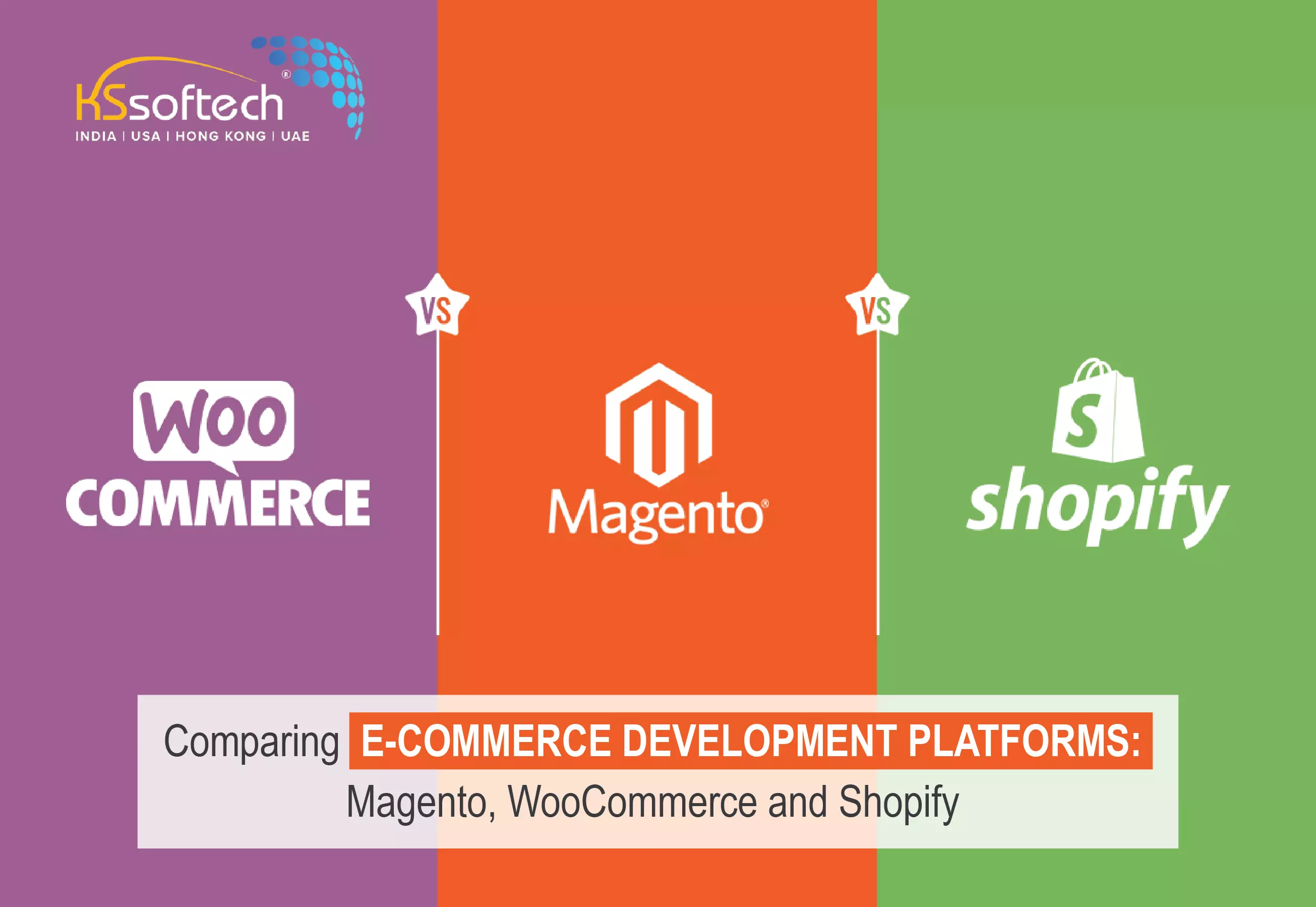E-commerce Development Platforms: Magento, WooCommerce, and Shopify
When it comes to building an e-commerce website, choosing the right platform can make or break your success. Whether you’re a small business owner or a large enterprise, your e-commerce platform needs to be scalable, flexible, and user-friendly, while also offering the features and tools you need to grow your business. In this article, we’ll compare three popular e-commerce development platforms: Magento, WooCommerce, and Shopify.
Magento: An In-Depth Overview
Magento is a powerful open-source platform that offers unmatched flexibility and scalability for businesses of all sizes. With its robust features and customizable options, Magento is an excellent choice for building complex e-commerce websites. Some of its key strengths include its modular architecture, multi-store functionality, and extensive customization options. Many well Known companies have chosen Magento for their e-commerce needs, showcasing its capabilities for large-scale operations.
WooCommerce: A WordPress E-commerce Solution
For WordPress websites, WooCommerce is a well-liked e-commerce plugin. As an open-source platform, WooCommerce offers businesses both flexibility and affordability. Its integration with the world’s most popular content management system, WordPress, makes WooCommerce a popular choice for businesses of all sizes. WooCommerce is known for its easy setup, user-friendly interface, and extensive library of plugins and extensions. Companies have found success with WooCommerce.
Shopify: A Hosted Ecommerce Solution
Shopify is a hosted e-commerce platform, making it an ideal choice for small business owners who want an all-in-one solution. Its user-friendly interface, powerful built-in features like abandoned cart recovery and integration with Facebook, make it an excellent option for businesses just starting in the e-commerce space. Shopify boasts an extensive library of themes and apps, enabling businesses to customize their online store easily. There are more than 10 million retail and wholesale brands that leverage Shopify’s robust platform.
Pricing and Costs
Magento has no upfront costs but may require significant development and maintenance costs based on the scope of the project. WooCommerce is free to use, but businesses will need to pay for web hosting and additional plugins as needed. Shopify charges a monthly subscription fee, as well as transaction fees for using external payment providers. When comparing pricing, it’s important to consider the long-term costs of each platform based on the size and budget of your business.
Ease of Use and User-Friendliness
Magento has a steep learning curve and requires expertise in web development to get started. WooCommerce is often user-friendly for those familiar with WordPress, but may not be as accessible for those without web design experience. Shopify is known for its ease of use and user-friendly interface for beginners, making it a popular choice among small business owners who are not tech-savvy.
Customization and Flexibility
Magento is highly extensible, offering businesses endless customization options through modules, plugins, and themes. WooCommerce offers flexibility through integration with WordPress plugins and themes, as well as custom coding options. Shopify’s platform offers customization options such as theme customization, app integrations, and custom domains. When evaluating the platforms for specific business needs, it’s critical to consider the level of customization and flexibility required.
SEO and Marketing Tools
Magento offers advanced SEO features and capabilities and is known for its strong foundation in organic search optimization. WooCommerce offers a robust suite of SEO plugins and integrations with marketing tools such as Mailchimp and Google Analytics. Shopify comes with built-in SEO features and integrations with social media platforms. Each platform offers unique SEO and marketing tools, so it’s important to consider the specific needs of your business.
Security and Data Protection
Magento offers security features such as multi-level access control, encryption, and vulnerability monitoring. WooCommerce offers standard security measures such as SSL and data backups, as well as plugins to enhance security. Shopify has a fully managed security system with automatic backup and SSL encryption. Compliance with industry regulations should always be a priority when choosing an e-commerce platform.
Performance and Scalability
Magento offers performance optimization through advanced caching and compression techniques, as well as scalability with its multi-store functionality. WooCommerce can scale to handle large traffic volume with proper coding and hosting. Shopify’s cloud-based hosting ensures fast loading and high-speed performance. Each platform offers solutions for performance and scalability based on your business needs and size.
Customer Support and Community
Magento offers support through forums, documentation, and training courses, as well as enterprise-level support programs. WooCommerce’s community offers access to forums, documentation, and developer resources. Shopify provides an all-in-one solution for businesses looking for a simple setup with limited technical requirements. The platform offers built-in payment processing and an easy-to-use interface that can be customized to specific business needs.
In conclusion, Magento, WooCommerce, and Shopify all provide unique offerings and advantages. By taking into account your specific business needs, you can make a well-informed decision of which platform to choose for e-commerce development. The comparison of E-commerce development platforms, namely Magento, WooCommerce, and Shopify, has provided valuable insights into the strengths and weaknesses of each. Magento stands out for its robust and scalable nature, ideal for large enterprises with complex needs. WooCommerce, being a WordPress plugin, offers flexibility and seamless integration for businesses already on the WordPress platform. Shopify, on the other hand, caters to users seeking a user-friendly and hassle-free experience with a focus on quick setup and management.
To embark on your E-commerce journey with confidence and precision, take the next step with KS Softech. Contact us today and let us help you transform your vision into a thriving online presence.
Related posts:
 Creating a Seamless Online Shopping Experience: Key Elements of a Successful E-commerce Website
Creating a Seamless Online Shopping Experience: Key Elements of a Successful E-commerce Website
 Unlock the Potential of Your Website with The Best Web Developer Company in Hong Kong
Unlock the Potential of Your Website with The Best Web Developer Company in Hong Kong
 The Importance of Website Security: Protecting Your Online Business or store in Hong Kong
The Importance of Website Security: Protecting Your Online Business or store in Hong Kong
 How to Improve SEO with Web Development and Design: Best Practises for Higher Rankings
How to Improve SEO with Web Development and Design: Best Practises for Higher Rankings





